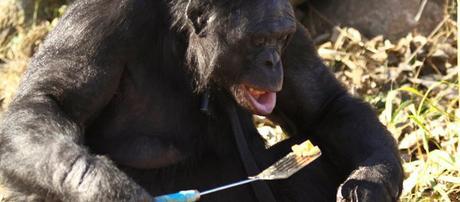
The human family split from chimps ~7 million years ago. Since then many differences have evolved between us. We began walking upright. Our brains got bigger. And we got fat! Yes, a new study into the evolution of our soft tissue has revealed that piling on the pounds may have been an evolutionary adaptation. As we spread into new environments extra energy reserves would have helped compensate for any lean times we experienced.
The research (and its problems)
Studying soft tissue like fat can be very challenging since it has a nasty habit of rotting away. We've yet to find any fossil fat on our ancestors, for example. So a group of researchers examined the remains of chimps and humans to identify any differences in soft tissue. Their logic being that a significant difference indicates that evolution has happened.
To eliminate the possibility that it was the chimps who had been evolving they also examined existing data for other apes. If all apes shared a characteristic and humans were unique then that would imply that humans had been evolving. Whilst if the chimps were special then they were the ones who had undergone some adaptation. However, it should be noted that the data on the other apes was relatively small (you don't get too many opportunities to dissect something that lives a long time).
So whilst the following is very interesting and well supported by the data, issues with that data mean a bit of salt is still needed. Hopefully someone will go cut up some orang-utans and confirm these conclusions.
Muscle evolution: boring and predictable
Humans walk on two legs. Chimps walk on four. As you might expect for species that move so differently, our muscles were also very different. Again - as you might expect - most of those differences seem to be linked to movement.
Humans have gained 15% more muscle in our legs. Such an increase would obviously help us move about on those legs. Again, all boring and rather predictable. However, there is something mildly interesting about where that muscle came from. That gain in our legs seems to have come straight from an equivalent loss in our arms.
We could have developed really strong legs and kept our strong arms, but we didn't. Evolution decided that the extra energy needed to grow those useless arm muscles was better spent elsewhere, suggesting our ancestors had a tough time. They couldn't afford to throw away that energy on unnecessary things.
Skin 2.0: a lighter, thinner model
We've lost some arm muscle over the course of our evolution. Our skin has also undergone some "losses" too. Most notably we lost all our hair! Or rather, it became so small and thin that it's practically non-existent.
Hair in chimps helps insulate them against heat. However, it's thickness and weight can backfire in extreme heat; trapping it. During the warmest days they're forced to seek shelter in the shade and even in caves. However, since they live in the jungle this shade is plentiful so isn't too much of an issue
Humans sweat instead. This helps keep us cool even in the hottest climates. Such a dramatic shifts suggests that our ancestors were living in a variety of environments. It also has the benefit of making our skin a lot lighter: almost half the weight of chimp fur!
And fat: piling on the pounds for a million years
But the most surprising change in our body was fat. Chimps, it turns out, have very little of it. Even in captivity it can be tough to put on weight. This results in a very dramatic difference between even the leanest human and chimps. Which suggests that this gain in fat in humans is an evolved trait.
Identifying why we got a bit chubby isn't something that this research can reveal. However, the scientists do suggest three likely possibilities:
- As humans began to live in different environments we needed more fat reserves. Harsher locations meant less food, so being able to store it in our belly became key.
- Fat reserves help speed up reproduction. It makes pregnancy less of a strain on the mother, allowing them to recover faster. Perhaps in the harsh environment humans migrated into they needed to get back on their feet quickly.
- This extra energy was needed to help power our large brains.
Or my favourite, some mixture of all of the above. At any rate, it gives me a great excuse to skip going to the gym today.
Reference
Zihlman, A. L., & Bolter, D. R. (2015). Body composition in Pan paniscus compared with Homo sapiens has implications for changes during human evolution. Proceedings of the National Academy of Sciences, 112(24), 7466-7471.

